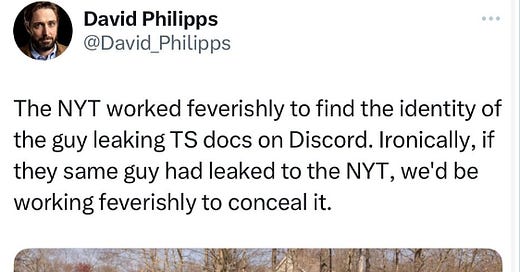How the Media Became the Pentagon’s Plumbers
By assisting in the apprehension of Jack Teixeira, the Fourth Estate shows it’s not very interested in government transparency or accountability.
Last month New York Times international correspondent David Philipps offered a mea culpa.
“I just deleted a tweet that lacked nuance,” the two-time Pulitzer Prize winner wrote.
Philipps, who in 2022 received the top award in journalism for his reporting on previously undisclosed US military strikes that killed thousands of civilians in Iraq, Syria, and Afghanistan, was walking back an observation made following the arrest of 21-year-old Jack Teixeira, the Massachusetts Air National Guardsman accused of leaking state secrets. Philipps noted the Times had worked “feverishly” to assist the Pentagon in identifying Teixeira.
“Ironically, if the same guy leaked to the NYT, we’d be working feverishly to conceal it,” Philipps wrote in the deleted tweet.
In an odd twist, the Times had gone from publishing state secrets to helping the government conceal them.
The Pentagon Papers, Then and Now
Publishing state secrets is an old game, one the New York Times knows well.
In 1971 the Grey Lady published classified materials — the Pentagon Papers — showing that the government was lying about the Vietnam War. Papers leaked to the Times by antiwar military analyst Daniel Ellsberg revealed that America’s foothold in the war-torn country was much worse than the public had been told.
While the Nixon administration — which secretly created a team of “plumbers” to plug the leaks — argued the documents were a threat to national security, the reality was they were primarily an embarrassment to the government. As R. W. Apple Jr. wrote in the New York Times a quarter century later, the Papers “demonstrated, among other things, that the Johnson Administration had systematically lied, not only to the public but also to Congress, about a subject of transcendent national interest….”
Tapes from the Oval Office of a June 14, 1971 conversation between Nixon and aide H.R. Haldeman confirm the assessment that government credibility was what was truly at stake. “To the ordinary guy, all this is a bunch of gobbledygook. But out of the gobbledygook comes a very clear thing,” Haldeman told Nixon. “You can’t trust the government; you can’t believe what they say… .”
One can argue that the Times was right to publish the Pentagon Papers, which exposed the government’s lies about Vietnam. Or one can argue it was wrong, since it undermined the war effort.
What’s clear is that the Times was fighting to expose the government’s secrets, not protect them.
‘Ukrainian Forces in Dire Straits’?
There are similarities between the Pentagon Papers and the Teixeira leaks. While it’s debatable whether the leaks put national security (or Ukrainian security) at risk, it’s clear they are an embarrassment for government officials.
READ THE REST OF THIS STORY at the American Institute for Economic Research.




